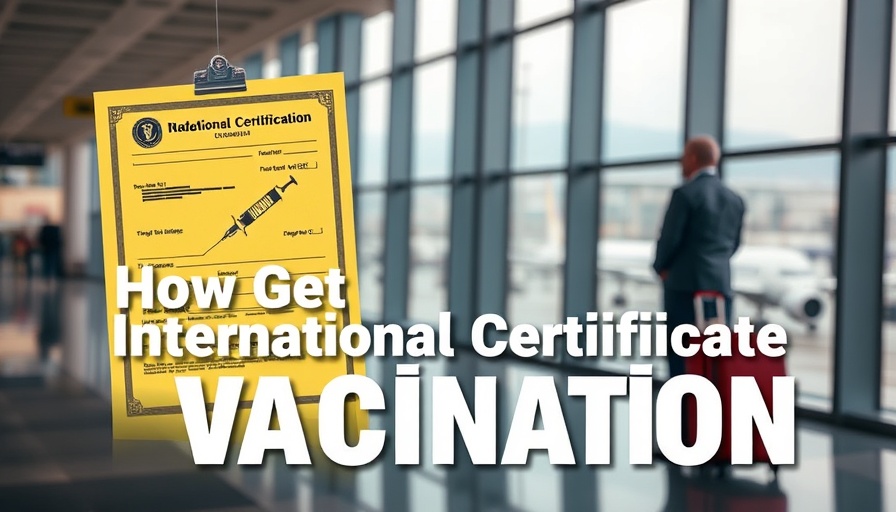
Why Vaccinations Matter Before Your Trip
As parents, ensuring the safety of our children during travels is paramount. Vaccinations, like the polio vaccine, serve as our protective shield against potential health risks encountered abroad. In an era where global travel is commonplace, understanding the health requirements of different countries is critical for our family's well-being.
Understanding the ICV: Your Travel Companion
The International Certificate of Vaccination (ICV), often called the yellow card, is a vital document for international travelers. It's essential for families touring countries where specific vaccinations like polio are mandatory. While not all destinations require this certification, having it can alleviate last-minute travel stress and assure you that you're compliant with health protocols.
Steps to Secure Your Polio Vaccine in the Philippines
Obtaining the polio vaccine and ICV in the Philippines is straightforward. Here’s a detailed breakdown of the process:
-
Register for a BOQ Website Account:
First, visit the Bureau of Quarantine (BOQ) website. Registration is simple - just sign up using your email address, verify your account, and if you’ve had an ICV before, retrieve your past records. -
Book an Appointment:
Navigate to the vaccination services on the dashboard and select the polio vaccine. Based on availability, you may also check for the yellow fever and occasional mumps vaccine. Be mindful to keep checking back as stocks can fluctuate. -
Choose a BOQ Location:
With multiple sites available across NCR, Luzon, Visayas, and Mindanao, you can choose the most convenient location for your family. It’s crucial to select a date that fits your schedule.
Available Locations for Your Convenience
Here are some key locations you can consider for vaccination:
- NCR: Manila Main Office, Mall of Asia, and Robinsons
- Luzon: La Union, Subic, and Batangas
- Visayas: Cebu Main, Dumaguete, and Iloilo
- Mindanao: Davao, Cagayan de Oro, and Zamboanga
The Importance of Vaccination Documentation
Obtaining an ICV is more than just a formality; it’s a testament to your preparedness as a traveler. It could be a lifesaver in countries requiring proof of vaccinations. Additionally, carrying this document can foster peace of mind knowing that health protocols are being adhered to.
Funny Anecdotes: Traveling with Kids and Health Preparations
Let’s face it: traveling with children can sometimes feel like managing a small circus. Just the other day, while prepping my kids for a trip, we turned the vaccination process into a lively game, which involved props and a bit of creativity. Who would have thought that a trip to the clinic would turn into a storytelling adventure? Find ways to incorporate fun into the process. It can make the experience less daunting for the little ones!
Cultural Insights: How Global Perspectives Shape Vaccination Policies
Understanding cultural attitudes toward health and vaccinations in your travel destination can enrich your experience. For example, in some cultures, vaccinations are seen as a rite of passage for children, while in others, there may be misconceptions. Familiarizing yourself with these perspectives can lead to insightful conversations during your travels.
Future Trends in Travel Vaccination Requirements
As international travel continues to grow, the landscape of vaccination requirements is likely to evolve. It’s essential for families to stay informed about changing policies as health organizations continue to monitor global health threats. Advancements in technology may also simplify how vaccination records are kept and shared in future travel scenarios.
Decisions You Can Make with This Information
Equipped with knowledge about vaccine requirements and processes, parents can make informed decisions that enhance their children's safety while traveling. Whether it’s adjusting travel plans based on vaccination availability or deciding on the destination itself, knowing your options is key.
Actionable Tips for a Safe Family Vacation
Traveling can be a thrilling adventure, but it’s essential to prioritize your family's health and safety:
- Stay updated on vaccination requirements and book early.
- Include health discussions in your family travel talks, making it a shared responsibility.
- Document and keep a list of all necessary vaccination records in a secure location.
By following these steps, you set up your travel experience for success and enjoyment! Don't forget to plan ahead, ensuring your family's healthcare needs are met with enough time for anything unexpected.
Time to Take the Next Step
Now that you know how to get the polio vaccine and the ICV in the Philippines, make health a priority in your travel plans. This preparation will ensure that your family can fully enjoy your upcoming adventures, exploring new destinations without worries!
 Add Row
Add Row  Add
Add 




 Add Row
Add Row  Add
Add 

Write A Comment